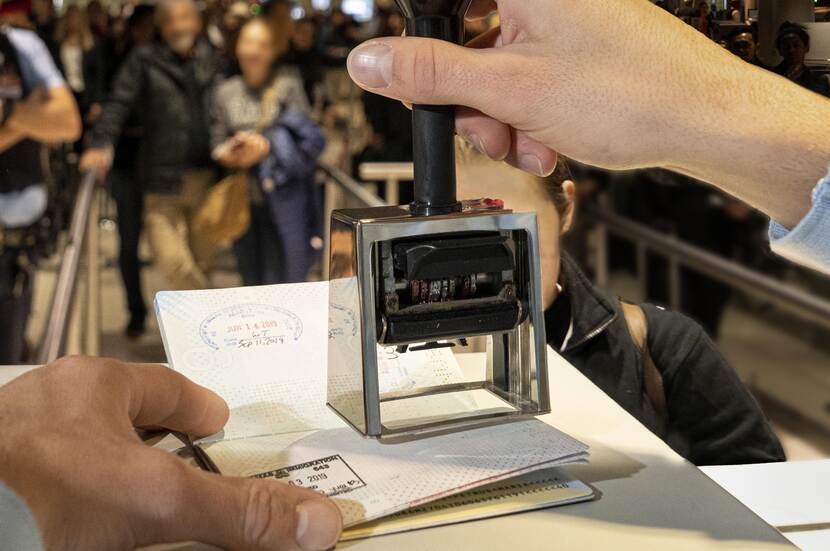‘Travellers appreciate clarity, even if it means they’re not allowed into the Netherlands’
With COVID-19 on the decline, international travel is gradually starting to pick up again. Even so, most non-EU nationals face both a flight ban and an entry ban for the European Union/Schengen Area. Mark van Elzakker and Thomas Claessens of the Immigration and Naturalisation Service (IND) give an update on the latest news, explain what it’s like working with partner organisations like the foreign ministry (BZ), and tell us about receiving birth notices and cakes from people they have helped.
Currently travellers from outside the European Union are subject to both a flight ban and an entry ban for the EU/Schengen Area. What’s the difference?
Mark: ‘The entry ban for non-EU nationals is a recommendation by the European Commission. The Netherlands adopted this recommendation on 18 March 2020. A day later, the entry ban went into effect. The flight ban for flights to the Netherlands, which applies to India, South Africa and countries in Central and South America, was introduced by the Netherlands itself. The reason for the ban is that highly contagious variants of coronavirus are known to be present in these countries.’

If a Dutch person finds themselves in a country that falls under the flight ban, how are they supposed to get home?
Thomas: ‘The flight ban doesn’t mean that there are literally no flights between the Netherlands and the countries in question. But in order to fly here, a traveller must qualify for an exemption. Having Dutch nationality is a valid reason. So Dutch people can still fly home.’

How do travellers react when they aren’t allowed into the Netherlands?
Mark: ‘Obviously, people aren’t happy when the IND issues a negative travel advisory. But the thing that’s struck me is that nearly every traveller simply accepts the decision. There are two reasons for that. We take travellers’ questions seriously. We don’t just send out a standard letter. People appreciate that and the clarity this offers. People also understand that the current guidelines are meant for the common good. The sooner we can put the COVID-19 pandemic behind us, the sooner we can travel freely again.’
Are people with an authorisation for temporary stay (MVV) allowed into the Netherlands?
Thomas: ‘The EU entry ban includes an exemption for people with an MVV: they are allowed into the Netherlands. However, travellers with an MVV who wish to travel to the Netherlands from a country that falls under the flight ban are not exempt from this ban.’
An MVV is valid for 90 days. If someone is not able to get into the Netherlands within that time limit because of the travel restrictions, what’s the next step?
Mark: ‘Dutch embassies and consulates are authorised to issue a new MVV if the current one has expired. The applicant does have to show that they were prevented from travelling to the Netherlands through no fault of their own.’
Do you ever make exceptions to the entry ban?
Thomas: ‘Exceptions are only made on humanitarian grounds or in unusually serious cases. In a situation like that we can recommend that someone be allowed into the Netherlands, even though they don’t have formal permission. These decisions are up to the head of the IND.’
Mark: ‘I remember one such an exception. A woman in the Netherlands had just had twins. One of the babies died shortly after being born. The woman’s mother and sister wanted to come to the Netherlands for the funeral, and we granted their request.’
Do you ever hear back from travellers who were allowed into the country?
Mark: ‘After a man was allowed to enter in order to attend the birth of his child, the couple were nice enough to send cakes and birth notifications to our office at Schiphol Airport. We also get thank-you notes from people who were able to say goodbye to a sick family member or attend a funeral. It’s heart-warming and emotional.’
The foreign ministry’s 24/7 Contact Centre is one of your partners. What’s it like working with them?
Mark: ‘Mostly, we hear from the 24/7 BZ Contact Centre when it’s not entirely clear if a particular traveller meets the conditions for entry into the Netherlands. We’re happy when they call, because sometimes we both arrive at the conclusion that the person in question is allowed in. Just this morning we were dealing with a woman who’d had a baby in May, and we were able to give her the happy news that her partner in Suriname, who has an MVV, could come to the Netherlands, despite the flight ban.’
What are your expectations for the summer of 2021?
Thomas: ‘Of course, we hope that the declining numbers mean we can lift more and more restrictions. Like the rest of the world, we also want to put all these rules and exemptions behind us and get back to working and travelling freely.’
